Economic Justice
House Agriculture Committee Chairman Frank Lucas has proposed a new farm bill that saves $38 billion over 10 years. However the bill saves money by cutting funding to food stamps. Politico reports:
But in real dollars — and as a proportion of his entire package — Lucas admits he is leaning more on food stamps. Last year the nutrition title contributed about $16.1 billion in savings, or less than half of the chairman’s mark. This year it is not just up by $4 billion, but also accounts for 53 percent of the Farm Bill savings and almost 60 percent of the new cuts — beyond those attributed to sequestration.

The television flashes images of a skeletal little girl whose ribs seem to be popping out of her ballooning stomach as she sits in a pile of mud and stares at the camera with large pleading eyes. A “1-800” number flashes on the bottom of the screen. A celebrity does a Public Service Announcement for building wells in Africa. YouTube has sharp pre-packaged videos pulling at our heartstrings, and even months after being released, the KONY 2012 viral video continues to float around the internet.
For Westernized cultures saturated with various forms of media and technologically driven information, social justice is becoming increasingly "packaged," carefully marketed, and commercially manufactured to be a product that incorporates the mission it represents.
Whether social justice organizations should be doing this is debatable. Like everyone else, they’re trying to survive in a capitalistic system that ruthlessly competes for our every dollar. The only problem is that we aren’t the ultimate consumers. For social justice non-profit groups, the sick, poor, starving, abused, and desolate are the true consumers; we’re just the financial and volunteer base needed to keep the system working. To do this, organizations are discovering that a corporate business model is sometimes the only way to survive — and sometimes thrive — within the cutthroat world of advertising and solicitation.
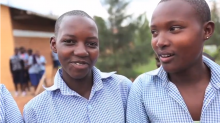
According to UNICEF, 29,000 children under the age of five – 21 each minute – die every day, mainly from preventable diseases.
The GAVI Alliance, a public-private partnership aimed at increasing worldwide access to immunizations, has a goal of reaching 250 million children by 2015. Dr. Mercy Ahun, GAVI special representative in Geneva, sat down with Sojourners to discuss the role of faith-based organizations in helping reach those 250 million,and the role her own personal faith plays in her work.
“What really got me into public health is my time in the children’s wards. We were working with children who had preventable diseases,” Ahun said. “… I thought to myself, why should stay here waiting for the children to fall sick before they come to the hospital. It’s better actually to go out there and prevent this in the first place.”

America is at a crossroads: We live in a society that promotes working for our own ends, but if we are to survive and flourish it is time to start sacrificing for the common good by working together.
In early April, advocates for public education traveled to Washington D.C. for Occupy the Department of Education (Occupy the DOE). Students, parents, educators, and community members came together to protest a current system that is designed to segregate our society, while demanding a public education system that devotes itself to the common good through sacrifice of self for the love of the whole.

In January, I received a phone message from a friend of ours. She needed to talk with me, she said. About something.
Not long after, I got an e-mail from Cordera (not her real name), our friend’s daughter:
“I am writing to you because my family and I have run into a problem. This summer President Obama passed the Deferred Action for Childhood Arrivals [of undocumented immigrants]. Over a long course of paperwork and appointments with the USCIS, I was able to receive a work authorized social security card and employment card. [But] without a student visa, I was not able to file for a loan. A few weeks after my first attempt, I found a bank that would be able to grant me a student loan with a US citizen or permanent resident as the co-signer. My father's uncle offered to help but . . . he was denied the credit.”
She wanted us to co-sign for a private loan in the amount of $35,000 to cover her first year of college. My heart sank. We couldn’t co-sign. Or we wouldn’t. I wanted to discourage her because of unfavorable and variable rates, immediate repayment, and long-term consequences of excessive indebtedness. I spoke with her university’s financial aid officer who intoned piously that the cost of the university experience was but one factor to consider: Cordera needed to hold onto her dreams, despite the crippling price tag of those dreams.
Last Tuesday, a building in Dhaka, Bangladesh that housed five garment factories collapsed, resulting in more than 400 deaths and 2,500 injuries. Estimates are that possibly hundreds more are still missing. Cracks had appeared in the buildings walls the day before and polices ordered it evacuated. Factory managers, however, ordered workers to return. The factories primarily produced cheap clothing for western markets.
Protest rallies have been held this week in Bangladesh. Today, May Day, a procession demanded safe working conditions and the death penalty for the building’s owner, currently under arrest.
The Associated Press reported that Pope Francis commented on the tragedy in his Mass for the feast of Saint Joseph the Worker:
"At the Vatican, Pope Francis said he was shocked by a headline about the building collapse that said some of the workers were living on 38 euros [$50] a month. "This was the payment of these people who have died ... and this is called `slave labor,'" he said. Vatican Radio said the pope made the remarks during a private Mass at the Vatican."
Read the Associated Press report.
If migrants and refugees worldwide were their own country, it would be the fifth most populous in the world today. Increasingly, it is women who are leaving their homes and families to seek work to support their families economically. They are the heads of households. They are the primary "breadwinners" for their extended families. They are also more vulnerable to sexual exploitation. The United Nations Population Fund recently hosted a week-long meeting to study the more than 100 million women who are migrant workers.IPS reports:
The face of migration is changing dramatically as women and girls now represent about half of the over 214 million migrants worldwide. And in some regions of the world, they outnumber their male counterparts, says Dr. Babatunde Osotimehin, executive director of the U.N. Population Fund (UNFPA). Addressing a week-long meeting of the 46th session of the U.N. Commission on Population and Development (CPD), which concluded Friday, he pointed out that many women migrate on their own as heads of households, to secure a livelihood.“Others leave their homes in search of more open societies, to get out of a bad marriage, or to escape all forms of discrimination and gender-based violence, political conflicts, and cultural constraints.”
Read more here.
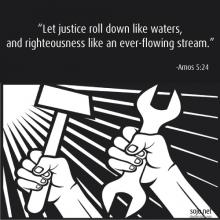
Editor's Note: The following is the text of an invocation being given at the May Day Rally in Madison, Wis.
When we gather at a place like our State Capitol, there are people here from all sorts of religious and non-religious backgrounds.
There are Christians and Jews, Muslims and Buddhists, Hindus and and Bahai, Humanists and people who are pretty sure they believe something, but don’t know exactly how the heck to describe it.
What connects us all this day is a spirit of hospitality, a spirit of compassion and a spirit of justice.
At their worst, religious and other beliefs can isolate us in little camps where we see outsiders as threats. At their best, they call us to hospitality, not only to those we know, but to the strangers in our midst – those who come from other places, speak other languages, seek a new life. At their best, they call us to embrace those who seek to be part of our community.
The first draft of form was confusing and complex so the Obama administration has created a simplified application for healthcare. The Associated Press reports:
Details to be released Tuesday include a three-page short form that single people can fill out, administration officials said. Medicare chief Marilyn Tavenner, also overseeing the rollout of the health care law, called it "significantly shorter than industry standards."
Read more here.
Today a $4 million plan was announced by the U.S. Department of Agriculture. The plan will increase the use of federal food credits at farmers markets by allowing retailers to use wireless technology to connect sellers with the SNAP program. The Washington Post reports:
“These grants increase the availability of fresh fruits and vegetables to SNAP customers and further encourage them to purchase and prepare healthy foods for their families using SNAP benefits,” said Agriculture Undersecretary Kevin Concannon.
Read more here.

What comes into your mind when you hear the word apocalypse? Most of us think of us think of the total destruction of the world, or at least life as we know it. Think zombies roaming the streets, feasting on brains. On the other hand, my sarcastic generation is doing a pretty good job of using apocalypse as a silly word. I remember a few years ago when we had a large winter storm here in Washington, D.C.; it was instantly dubbed Snowpocalypse!
The English word apocalypse derives from the ancient Greek apocalupsis, which is the original title for the infamous Book of Revelation. Revelation involves a lot of fire, smoke, battles, and things generally blowing up, so it’s understandable that today we would associate apocalypse with end-times battles. However, the word apocalypse contains a much deeper meaning. Far more profound than the long-awaited zombie hordes – or even the end-times prophecies of some churchgoers – this ancient, misunderstood word is an essential tool for comprehending the world we live in.
Apocalupsis is a term that means unveiling – as in setting aside a covering to discover what lies underneath. At the most basic level, the Book of Revelation is about removing the blindfold that the Powers have pulled over our eyes, allowing us to see the world as it really is. Revelation is about unveiling Empire, exposing the ways in which powerful interests destroy the earth and enslave other human beings to promote their own luxury and power. Despite its reputation, Revelation is not about a future-oriented, earth-hating vision of universal destruction. On the contrary, it is a vision of a new creation and universal restoration – the world finally set right and edenic harmony restored in the midst of the city.
OK – great, you may be saying. Nice to know, but how is this relevant to me?
Fair question. It’s true that the Book of Revelation was written almost 2,000 years ago. Those were the days of the Roman Empire – think Ben Hur and Spartacus. For sure, things have changed a lot since then.
Yet, the more things change, the more they stay the same.
Annie Lowrey reporter for the New York Times, writes about a new study released by the Urban Institute. The study found:
"The racial wealth gap yawned during the recession, even as the income gap between white Americans and nonwhite Americans remained stable. As of 2010, white families, on average, earned about $2 for every $1 that black and Hispanic families earned, a ratio that has remained roughly constant for the last 30 years."
However the wealth gap continues to grow.
"Before the recession, non-Hispanic white families, on average, were about four times as wealthy as nonwhite families, according to the Urban Institute’s analysis of Federal Reserve data. By 2010, whites were about six times as wealthy"
Read more here.
The Ecclesial Network for the Amazon, a Catholic church network representing 12 Latin American countries, met recently in Puyo, Pastaza, Ecuador, challenging unrestrained market forces that are decimating the Amazonian ecosystem. The Network has been established to provide on-the-ground facts about Amazonia's environment, indigenous communities, and to strengthen the church in the region. Agenzia Fides reports:
"Many people still think that there is an unlimited amount of energy and resources that can be used, and that the negative effects of the wild manipulation of nature can be easily absorbed. But this is totally false." Such attitudes, Catholic Bishop Julio Parrilla continued, "are not rooted in science or technology, but in a technocratic ideology that serves the interests of the market." The Bishop concluded by reiterating "the influence of secularization, because when man turns away from God, he falls into the temptation of thinking that everything is permitted, in order to meet one’s immediate needs and desires."

By definition, an anesthetic is a drug used to relieve pain (analgesia), relax (sedate), induce sleepiness (hypnosis), spark forgetfulness (amnesia), or to make one unconscious for general anesthesia. Anesthetics are generally administered to induce or maintain a state of anesthesia and facilitate a procedure. I believe that anesthetic can be employed as a striking image for particular deficiencies in faith-based responses to extreme poverty.
As one can cite many examples where faith is proclaimed and practiced solely as an escape from – rather than engagement with – the numerous struggles associated with impoverishment, we recognize that anesthesia is incomplete without corresponding acts of sustainable social surgery.
...
A practical way to serve within the tension of anesthetic and advocate is to experience a small portion of life below the poverty line. The World Bank sets extreme poverty as below $1.50 per day, and I plan to stand in solidarity by attempting to eat on less than $1.50 per day over the course of five days (Monday – Friday).
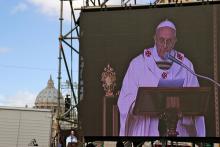
Vatican employees won’t receive the special bonus they are traditionally awarded when a new pope is elected, the Vatican confirmed on Thursday, under orders from Pope Francis to give extra money to charity instead.
“On account of the difficult situation of the general economy, it seemed neither possible nor opportune to burden Vatican institutions with a considerable unforeseen extraordinary expense,” the Vatican’s chief spokesman, the Rev. Federico Lombardi, said in an emailed statement.
In place of the employees’ bonus, Pope Francis ordered Vatican officials to make a donation to some “charitable organizations.”
The money will be drawn from the pontiff’s personal charity budget “as a sign of the church’s attention for the many people who are suffering” from the global economic slowdown, Lombardi said.
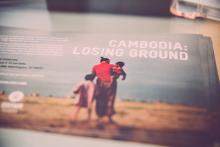
Photographs tell stories. At least, good ones usually do.
And there were some good pictures on display in Washington, D.C., for Oxfam America’s pop-up photo exhibit from acclaimed photographer Emma Hardy, whose work is regularly featured in The New York Times magazine, TIME, Vanity Fair, and Vogue.
The images tell the particular stories of Cambodians directly affected by land grabbing, the buying or leasing of large pieces of land in developing countries, by domestic and transnational companies, governments, and individuals, which in turn displaces the poor and vulnerable.
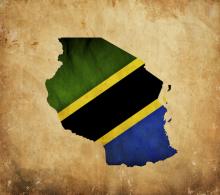
I spent an entire day a couple of months ago in an outpatient clinic (I'm fine; thanks for asking). I met a lot of nurses, and every one of them was excellent.
When Velda came to take away the remains of my lunch, I offered her my untouched can of ginger ale.
"I don't drink soft drinks," she replied. Since I rarely do either, we started chatting.
Velda grew up in Tanzania, moved to Belgium, spent several years in London, and finally came to the United States. She returns to Tanzania regularly, and she is not happy with what she sees.
"I grew up eating lots of vegetables," she told me. "We might have had ice cream once every three years. But now people are eating American-style junk food. They don't know it's not good for them."

The common good is not only about politics. The common good is about life and how we live it. It is ultimately about how we are all connected. It is about how our love or lack of love affects our families, our neighbors, our communities, our cities, our nation, and our world.
The common good is about personal brokenness. Have we taken the time to let Jesus come in and heal the wounds that distort the image of God within of us — wounds that drive daughters and sons, mothers and fathers to self-destruction? Have we taken the time to let the Great Physician heal the personal wounds that break families and friendships, slicing the central fabric of society? We are all connected.
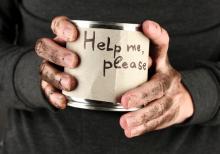
As has happened many times after I have given a talk about the Body of Christ’s responsibility to care for their brothers and sisters experiencing impoverished and dehumanizing conditions, I was asked to answerthose questions — the ones in my experience that are always the first to be asked the moment I stop speaking.
“How will I know I have given enough? How does the church balance financial responsibility with service to the poor? Where do we draw the line?”
These questions always come, sometimes spoken in a curious tone by a person whose heart is being convicted, sometimes in an angry accusing tone insinuating I must hate prosperity, sometimes privately as a whisper in my ear or in a personal email filled with insinuations about my sanity. What a preposterous proposal, that the Body of Christ in any particular location should be the first resource to its own community for spiritual, physical, and emotional well being! Don’t I know that such a mission is naïve and impossible to achieve? Most recently it was phrased like this: “I love this idea, but it is difficult to see benevolence funds go towards someone's electric bill when they smell like they smoked five packs of cigs before meeting with us; what do we do?”
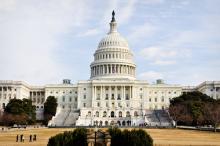
While immigration and gun violence issues are capturing most of the week's headlines, the budget battles have re-emerged in Washington, D.C. Last month House Budget Chairman Paul Ryan (R-Wis.) and Senate Budget Chairwoman Patty Murray (D-Wash.) released competing budget proposals. And today, President Barack Obama released his own plan, which aims to reduce the deficit through a combination of spending cuts and revenue increases.
As The Washington Post's Ezra Klein and Evan Soltas note:
Today’s budget is the White House’s effort to reach the bedrock of the fiscal debate. Half of its purpose is showing what they’re willing to do. They want a budget compromise, and this budget proves it. There are now liberals protesting on the White House lawn. But the other half is revealing what the GOP is — or, more to the point, isn’t — willing to do. Republicans don’t want a budget compromise, and this budget is likely to prove that, too.
As the White House sees it, there are two possible outcomes to this budget. One is that it actually leads to a grand bargain, either now or in a couple of months. Another is that it proves to the press and the public that Republican intransigence is what’s standing in the way of a grand bargain.